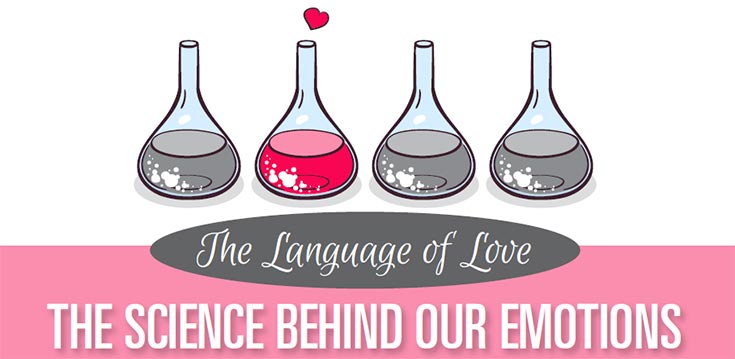
Google defines emotion in two ways: “a natural instinctive state of mind deriving from one’s circumstances, mood or relationships with others; instinctive or intuitive feeling as distinguished from reasoning or knowledge ”
Seems simple enough, doesn’t it? But emotions are incredibly complicated, indeed almost indefinable. Why do we have feelings? Why do we react the way we do? And why do the emotions of others define the way we feel?
Modern science tells us that emotions are complex neurological connections, a chain reaction of hormones that are released specific to the situations we face. For example, romantic love is a select combination of hormones – dopamine, norepinephrine and phenylethylamine – that race through your brain. Blood flow increases, rushing to the dopamine receptors in the brain, inducing euphoria. Norepinephrine adds to the excitement, making the heart beat faster. Phenylethylamine is a natural nootropic chemical that adds to the effect of dopamine in the brain — interestingly, this is also found in chocolate, which may explain the mood-boosting effect of eating a Dove bar. It is visible in an fMRI and is the beginning of true love.
Serotonin levels lower, increasing the bond between two people and, as the relationship grows, oxytocin is released. Vasopressin combines with the oxytocin, which makes the excitement of the dopamine/norepinephrine fade away, leaving a mature relationship in its place.
Into these relationships children are born. Oxytocin is again a major player in the mother/child bonding. Parents nurture the baby and, as he or she grows older and other siblings arrive on the scene, love becomes complicated. Children naturally look to their parents as role models as they develop into adults. But emotions are intangible; they are just reactions in various parts of the brain. How can parents be sure their children feel loved?
Kim Finucan, a licensed professional counselor and founder of Changes Counseling Center, explained that children thrive on three major factors: consistency, validation and communication of affection.
- CONSISTENCY means that parents keep their promises and that children know what to expect and when.
- VALIDATION is the recognition that their feelings and experiences are valid.
- COMMUNICATION of affection is using the child’s “love language” of snuggles, telling them that they are loved, spending one-on-one time and listening to their thoughts and imaginations.
But just as each adult relationship is different, each parent/ child relationship can vary within the family context.
Speaking to the question of whether parents love each child differently, Finucan responded that “love is a multifaceted emotion,” explaining that each relationship develops with different intensities and is not easily quantified as equal.
“For instance, you love your spouse and you love your mother, but you may show your love in different ways,” Finucan said. “There is not a set definition or expression of love so it may differ from child to child.”
Additionally, parenting can vary between mother and father as each one brings their own personal baggage and learned styles of parenting from their own childhood. Ideally, their styles complement each other without confusing the children.
“Mothers and fathers at times have different love languages and therefore may have a preferred way to communicate love to their children,” she said. “We all bring our unique qualities, values and learned experiences to all of our relationships, which affect how we express our emotions.”
Our emotions are further complicated when there is more than one child in a family. Sibling rivalry is normal and to be expected as each child jockeys for position in an effort to develop their own identity.
“Parental attitude is important in treating each child as an individual and not trying to treat each child the same,” Finucan said.
No matter how careful parents are, they may hear the dreaded words, “you don’t love me!” Real or perceived, this can cause a child to act out to draw attention, to become an overachiever or to become depressed and withdrawn.
Finucan explained that there are no set rules when emotions and perceptions are involved.
“To change these behavioral patterns, parents should evaluate how they are meeting the three concepts listed above,” she said.
When family problems get out of hand, professional counseling may be needed to shed light on the specific issues.
“Counseling is a great opportunity to identify and utilize family strengths to resolve issues or learn new methods for dealing with day-to-day challenges,” Finucan advised.
It is important to try to understand what lies beyond our emotions. Physiological responses – for example, when we get butterflies in our stomach or feeling our heart race – can make it challenging to decipher exactly what we are feeling. Moreover, we can experience more than one emotion at time.
“Science shows us that emotions are visible on brain scans and how they affect hormones, neurotransmitters and impact our daily functioning,” Finucan said.
“The mind/body connection is constantly being researched, and we learn more and more over time, which will provide more clues on how emotions impact our relationships,” she said.






